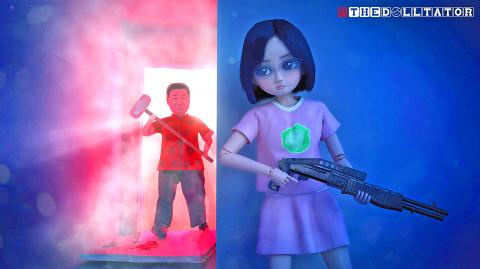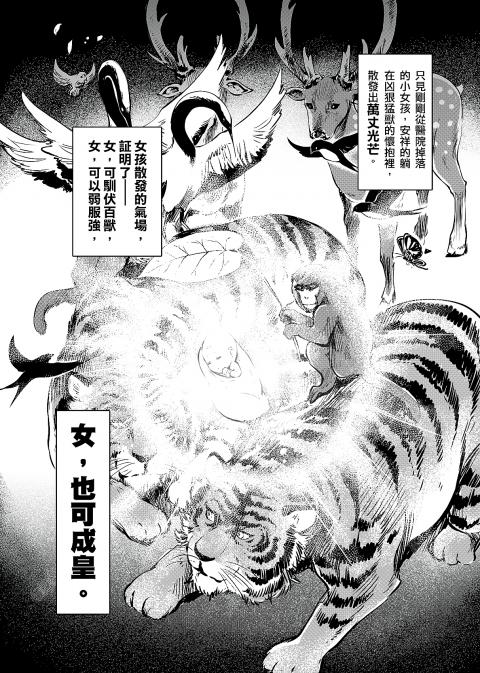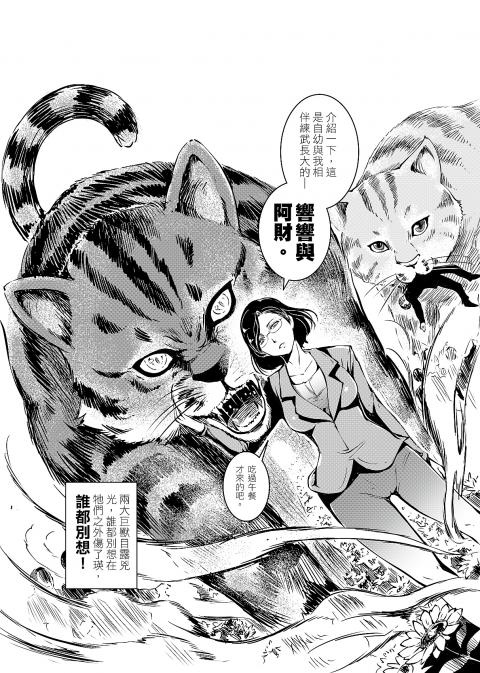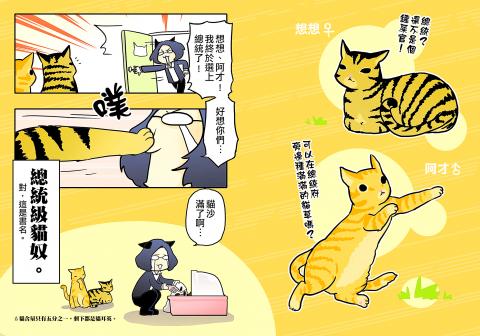Political manga perfectly combines two distinguishing features of life in Taiwan — irreverence toward politicians and a Japan-influenced love of manga and anime stylings.
And since President Tsai Ing-wen’s (蔡英文) unprecedented rise to Taiwan’s highest office in 2016, she has become a compelling character for local comic book artists. This is no coincidence, for the medium excels at portraying exceptional and exaggerated personalities. And their playful depictions of Tsai reveal complex and evolving attitudes toward female political leadership.
TAIWAN’S SUPERWOMAN

Photo courtesy of Lincoln Li
In Conquerer of the Seas Emperor Ing (霸海皇英), published in August 2016 by Wei Tsung-cheng (韋宗成), a young girl named Ing (瑛) grows up on a patriarchal island-nation caught in the shadow of a dictator surnamed Chiang (蔣). At her birth, she radiates a feminine glow that literally tames wild animals. She grows up to overthrow the oppressive forces that terrorize her people.
The work is a thinly veiled recasting of Tsai’s life and 2016 election victory in the genre of superhero comics, meaning black-and-white morality, characters with superhuman abilities, epic battle scenes, dramatic narration and stylized dialogue.
“Since politicians are always mocking and manipulating (惡搞) the people, I thought of creating a book that did the same to them in the form of a Taiwanese martial arts fantasy,” Wei told the Taipei Times.

Photo courtesy of Wei Tsung-cheng
Emperor Ying was his sophomore effort and a natural sequel to 2009’s Emperor Ma Arrives (馬皇降臨), about then-president Ma Ying-jeou (馬英九).
Emperor Ma Arrives describes the rise of Huang (騜), an analog of Ma, under the tutelage of the family of Chiang Kai-shek (蔣介石). Huang trains to meet the Bian Emperor (扁皇) in a pugilistic showdown, where he finally claims his rightful place on the throne. Like Ing, Huang’s sex appeal is emphasized and he often appears shirtless with bulging muscles. Yet unlike Ing, Huang does not have any feminine energy to set him apart in a world run by powerful men. Instead, Wei has Huang’s power come from being the human incarnation of a dragon.
Unlike editorial cartoons satirizing topical political issues and figures, Taiwan’s political manga is a grassroots medium. Artists usually test the waters by posting works on social media first, with only the most popular making the leap to print publishing.

Photo courtesy of Wei Tsung-cheng
With few exceptions, the depiction of women in comic books has long been a lightning rod for controversy. The medium is often criticized for flattening female characters into gendered stereotypes with limited agency, whose main preoccupation is to compete with each other for a man’s affections. Think of the girl-next-door and femme fatale archetypes popularized by Betty and Veronica as they chase after the eponymous Archie.
Female characters are also framed by what British film theorist Laura Mulvey has called the “male gaze,” in which women appear as sexual objects for men’s viewing pleasure. The practice is so ubiquitous in manga and anime that it has spawned its own terminology — “fan service,” which describes the gratuitous cleavage or panty shots that have no apparent relation to the story.
Given the spotty record of female representation in comic books, stories centered on Tsai contain an intriguing tension as they pit conventions of the medium against the reality of a female president who has shattered glass ceilings.

Photo courtesy of Stupid Sheep and Strange Creatures
Even as Ing is busy defeating her foes, Wei’s character design and panel composition emphasize her appeal to male fantasies. As a girl, her doe-like appearance in a school uniform sparks fights between neighborhood boys. As a woman, tight-fitting pantsuits accentuate her bosom and cling to her inner thighs.
Wei said that while the irony of Ing’s sexualization amid her story of overcoming patriarchal forces was “very interesting,” the character was designed on the basis of “business considerations.”
“The main character of a comic must have a certain visual appeal in order to attract readers,” he said, adding that the same principle of beautification was also applied to the male lead of Emperor Ma Arrives.
‘A GENTLE FEMALE PRESIDENT’
While some may view such artistic decisions as subject to the logic of the market, other artists find meaning in playing against readers’ expectations.
On Jan. 2, the day of Chinese President Xi Jinping’s (習近平) speech on the question of unification, a graphic of a bespectacled and bobbed young girl armed with a rifle in position to ambush an older man holding a primitive sledgehammer began to circulate on social media.
“‘Sledgehammer Diao’ vs ‘Shotgun Dsai.’ Who will win?” the caption teases. Dsai and Diao closely resemble Tsai and Xi respectively. The message is clear: Dsai’s relative firepower subverts the visual cues of her fairer sex, tender age and dainty physique clad in pastel pink. To underestimate her would be foolish.
The graphic was made by The Dolltator (娃娃獨裁者), pen name of US-based 3D animator and filmmaker Lincoln Li (李宇豐). Li designed his characters to personify political values associated with their real-life counterparts. Dsai in particular embodies Tsai’s image as an “iron fist in a velvet glove.”
“In my opinion, the mission of art is to discuss the humanity that lies behind a certain social issue, said Li, adding that the graphic was his way of “criticizing the bullies who pick on the weak, while praising the weak who strive to be strong and stand up to the mighty.”
Perhaps what Tsai’s presidency ultimately gives the comic book medium is the same that her supporters find in her — the chance to imagine a leading lady who is not afraid to deviate from expectations of her gender, and who turns her perceived weaknesses into strengths.
It is a direct response to those who have criticized Tsai for being an unmarried and childless woman. For Han Ching (韓璟), spokesperson for artist Stupid Sheep and Strange Creatures (蠢羊與奇怪生物), “it is precisely because [Tsai] overturned those traditions that we have a chance to see more possibilities, and she demonstrates for us that women can have an alternative way of life.”
Han said that Stupid Sheep’s comic Presidential Slave to Cats (總統級貓奴) is an attempt to make Tsai more approachable by portraying her in the cute likeness of a cartoon character. The comics highlight Tsai’s devotion to real-life pet cats Think Think (想想) and A-tsai (阿才). While this approach is lighthearted, Han noted that the reality is sobering.
“Taiwanese society, especially in the political sphere, is not that friendly to women,” Han said, pointing to past criticism of Tsai for not being more strident, or “manly,” in her administration’s cross-strait policy.
What to do when one is neither enough of a man nor enough of a woman for the public’s liking?
“Our society needs to break away from dualistic thinking,” said Han, adding that ultimately, “the idea of ‘a gentle female president’ should not present a conundrum,” because gentleness is neither an essentially female attribute nor inherently weak.
Cultural representation has always been a central part of any effort to change societal attitudes and mindsets. One can only hope that Taiwan’s comic book artists and other creators of popular culture will continue to strive to depict women — and men — fairly and respectfully.

April 14 to April 20 In March 1947, Sising Katadrepan urged the government to drop the “high mountain people” (高山族) designation for Indigenous Taiwanese and refer to them as “Taiwan people” (台灣族). He considered the term derogatory, arguing that it made them sound like animals. The Taiwan Provincial Government agreed to stop using the term, stating that Indigenous Taiwanese suffered all sorts of discrimination and oppression under the Japanese and were forced to live in the mountains as outsiders to society. Now, under the new regime, they would be seen as equals, thus they should be henceforth

Last week, the the National Immigration Agency (NIA) told the legislature that more than 10,000 naturalized Taiwanese citizens from the People’s Republic of China (PRC) risked having their citizenship revoked if they failed to provide proof that they had renounced their Chinese household registration within the next three months. Renunciation is required under the Act Governing Relations Between the People of the Taiwan Area and the Mainland Area (臺灣地區與大陸地區人民關係條例), as amended in 2004, though it was only a legal requirement after 2000. Prior to that, it had been only an administrative requirement since the Nationality Act (國籍法) was established in

With over 100 works on display, this is Louise Bourgeois’ first solo show in Taiwan. Visitors are invited to traverse her world of love and hate, vengeance and acceptance, trauma and reconciliation. Dominating the entrance, the nine-foot-tall Crouching Spider (2003) greets visitors. The creature looms behind the glass facade, symbolic protector and gatekeeper to the intimate journey ahead. Bourgeois, best known for her giant spider sculptures, is one of the most influential artist of the twentieth century. Blending vulnerability and defiance through themes of sexuality, trauma and identity, her work reshaped the landscape of contemporary art with fearless honesty. “People are influenced by

The remains of this Japanese-era trail designed to protect the camphor industry make for a scenic day-hike, a fascinating overnight hike or a challenging multi-day adventure Maolin District (茂林) in Kaohsiung is well known for beautiful roadside scenery, waterfalls, the annual butterfly migration and indigenous culture. A lesser known but worthwhile destination here lies along the very top of the valley: the Liugui Security Path (六龜警備道). This relic of the Japanese era once isolated the Maolin valley from the outside world but now serves to draw tourists in. The path originally ran for about 50km, but not all of this trail is still easily walkable. The nicest section for a simple day hike is the heavily trafficked southern section above Maolin and Wanshan (萬山) villages. Remains of